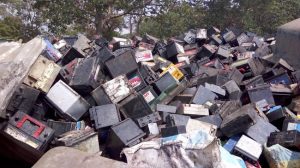The Federal Government of Nigeria has unveiled the National Environmental (Battery Control) Regulations 2024 to prevent and minimise pollution and waste emanating from batteries in Nigeria.

The regulations seek to ensure environmentally sound management of used batteries in the country.
Minister of Environment, Balarabe Lawal, stated this at the unveiling of the document on Thursday, August 29, 2024, in Abuja.
He said that the regulations also seek to address the challenges of waste battery management in Nigeria.
Lawal said it was in line with the provisions and recommendations of the Basel and Bamako Conventions, and other related guidelines for the Environmentally Sound Management (ESM) of hazardous waste.
The minister was represented by Mr Usman Bokani, Director, Pollution and Public Health, National Environmental Standards and Regulations Enforcement Agency (NESREA).
He said that batteries, particularly those used in renewable energy, telecommunication and automotive sectors, were critical to Nigeria’s economic development.
Lawal said that batteries contained hazardous materials such as lead, mercury, cadmium, and lithium amongst others.
He said batteries when improperly disposed of, could lead to severe health conditions including cancer, kidney damage and neurological disorders.
“Vulnerable populations, particularly children, face the greatest risk from exposure to these toxic substances.
“These regulations aim to ensure the environmentally sound management of all types of batteries throughout their life cycle, from production, usage, collection, transportation, storage, recycling and disposal.
“The informal sector, which often handles waste batteries without regulation, significantly contributes to environmental pollution, including soil, air and water contamination,” he said.
In an address, Dr Innocent Barikor, Director-General, NESREA, said the regulations would support the Government’s efforts to ensure sustainable handling of waste batteries.
“The enforcement of this germane Regulation therefore would address the gaps in the abatement of unsound environmental practices in the entire Battery value chain.
“It will also prevent possible adverse health impacts on the target population, especially women and children who are vulnerably involved in the mishandling of batteries, especially Used Lead Acid Batteries (ULABs),” he said.
In a goodwill message, Rep. Pondi Gbabojor, the Chairman, House of Representatives Committee on Environment, said the regulation represented a significant milestone in stakeholders’ collective efforts to protect and preserve the environment for future generations.
Gbabojor, who was represented by his deputy, Rep. Terseer Ugbor, commended NESREA for their unwavering commitment to safeguarding Nigeria environment.
He said that batteries are essential components in many of the devices and technologies that power our modern lives.
“However, improper disposal and management of batteries pose a significant threat to our environment and public health,” he said.
By Doris Esa
